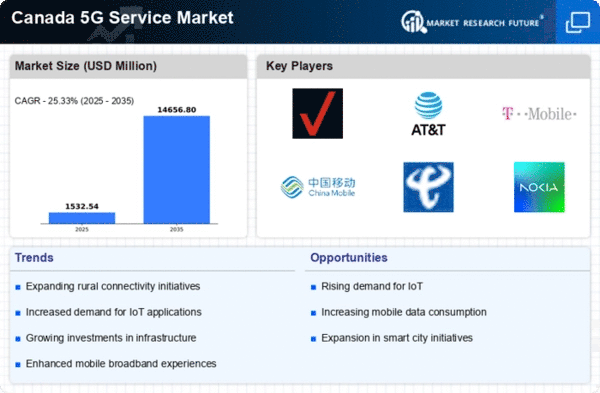Expansion of Smart Cities
The concept of smart cities is gaining traction in Canada, significantly impacting the 5g service market. Municipalities are increasingly adopting smart technologies to enhance urban living, improve public services, and promote sustainability. The integration of 5g networks is essential for the successful implementation of smart city initiatives, as it enables real-time data collection and analysis. For example, cities are utilizing 5g to optimize traffic management, enhance public safety, and improve energy efficiency. As more cities embark on this journey, the demand for 5g services is expected to rise. The 5g service market is thus likely to see increased investments and innovations aimed at supporting smart city developments.
Increased Adoption of IoT Devices
The proliferation of Internet of Things (IoT) devices is a significant driver of the 5g service market in Canada. With the increasing number of connected devices, ranging from smart home appliances to industrial sensors, the demand for high-speed and low-latency networks is escalating. It is estimated that by 2027, there will be over 1 billion IoT devices in Canada, necessitating robust 5g infrastructure to support their operation. This trend is prompting telecommunications companies to invest in expanding their 5g networks to accommodate the growing IoT ecosystem. The 5g service market is thus positioned to benefit from this surge in IoT adoption, as it enables new applications and services that enhance efficiency and connectivity.
Government Initiatives and Support
Government initiatives play a crucial role in shaping the 5g service market in Canada. The Canadian government has recognized the importance of 5g technology for economic growth and innovation. As part of its strategy, it has allocated substantial funding to support the deployment of 5g networks across urban and rural areas. For instance, the government aims to ensure that 90% of Canadians have access to high-speed internet by 2026. This commitment not only enhances connectivity but also fosters competition among service providers, driving down prices and improving service quality. The 5g service market benefits from these initiatives, as they create a conducive environment for investment and development.
Growth of Remote Work and Telecommuting
The shift towards remote work and telecommuting is reshaping the landscape of the 5g service market in Canada. As organizations embrace flexible work arrangements, the need for reliable and high-speed internet connections has become more critical than ever. A recent survey indicates that over 60% of Canadian companies plan to maintain remote work options post-pandemic. This trend drives demand for 5g services, as employees require seamless connectivity to collaborate effectively. Telecommunications providers are responding by enhancing their 5g offerings to cater to this growing segment. The 5g service market is thus adapting to the evolving work environment, ensuring that businesses and employees remain connected.
Rising Demand for High-Speed Connectivity
The 5g service market in Canada is experiencing a notable surge in demand for high-speed connectivity. As consumers and businesses increasingly rely on digital services, the need for faster and more reliable internet connections becomes paramount. According to recent data, approximately 80% of Canadian households are expected to adopt 5g services by 2026. This growing demand is driven by the proliferation of smart devices and the Internet of Things (IoT), which require robust network capabilities. Consequently, telecommunications companies are investing heavily in expanding their 5g infrastructure to meet this demand. The 5g service market is thus poised for significant growth as it adapts to the evolving needs of consumers and enterprises alike.
















